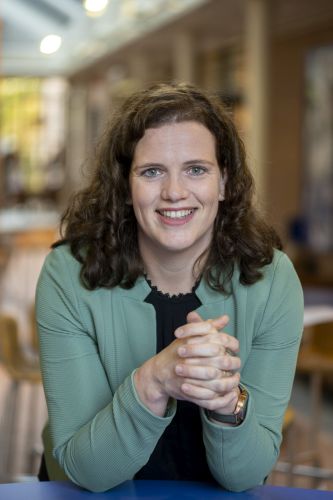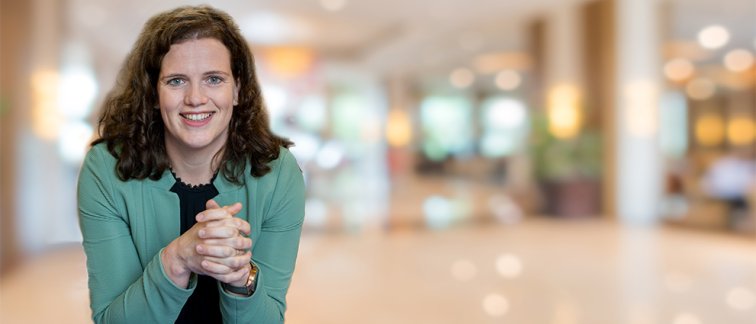Dr. Anne Eskes is a principal investigator at Cancer Center Amsterdam (CCA) focused on developing evidence-based improvements in patient care and promoting the role of nursing professionals in research. She is also a principal nurse educator at Amsterdam UMC and Professor by special appointment at the Amsterdam University of Applied Sciences. Anne recently became a co-theme leader of Supportive Care at Cancer Center Amsterdam, a member of the CCA Research Board, and is also affiliated with the Amsterdam UMC research institute Amsterdam Public Health. In this edition of ‘what do you do & why do you do it’, Anne Eskes tells all about her research and drive to improve care standards.
What do you do?
My background is in nursing and clinical epidemiology, but now I am a PI at CCA and - together with Lia van Zuylen – a co-leader of the theme ‘Supportive Care’.
In this theme group, we are striving to shift the focus from solely treating the cancer to considering the whole person. It is really important to engage patients and their families in the care process to tailor heathcare services for their unique needs and preferences. This way, we can deliver more personalized and effective care that makes a positive impact on quality of life.
Together with Els van Nieveen van Dijkum, we are developing a research line into how to engage and support family members as active participants in the care process. Traditionally in healthcare, the focus is solely on the patients and curing the disease. But by engaging the families, we can unlock so much more, from improving shared decision making to active participation in a person’s care.
We recently received funding from KWF [see text box] to implement a caregiving program we developed in which we train willing family members in postoperative cancer care during hospitalization. In this program, a family member stays with their loved ones in the hospital following a major surgery 24 hours a day for five days. They receive training in how to assist in basic care activities known to prevent complications after surgery, such as wound care, aiding in physical activity (mobilization), engaging in joint meals, and conducting breathing exercises. We also emphasize the need to communicate with patients frequently about news and daily events to prevent or assess mental confusion. We tailor the training according to the wishes and capabilities of the family member.
For many, being close together during trying times is already a win-win situation, but as researchers we also look at the qualitative gains in actual care provisions. By involving and educating family members of patients with cancer in providing care after surgery, we can improve the transition from hospital to their homes and lessen the dependence on professional home care.
In a recent study involving 300 patients, we saw a 17% reduction in the need for professional care at discharge when a family caregiver was involved. More importantly, patients reported a higher satisfaction when family members were part of the care process.
We are now planning follow up research to have a closer look whether the type of care provided by professionals in the home setting has changed as well, and what strategies are needed to sustainably implement this program in oncological surgical care . Based on the data from our previous studies, the Dutch Cancer Society has awarded a grant to implement our family participation program throughout the Netherlands.
KWF funding: Empowering families in the care process of patient with cancer
ARTIS-2: a controlled pre- and post-measurement study aimed at implementing a caregiving program in postoperative cancer care
Patients with cancer undergoing major surgery often require long-term care. Researchers at Amsterdam UMC have developed a training program to prepare willing family members to provide care to their loved ones once they return home after surgery. Initial results of the program are promising, but not yet tested in other hospitals. Dr. Anne Eskes (senior nursing researcher) and Professor of Surgery Els Nieveen van Dijkum received more than half a million euros to investigate the strategies needed to implement the family care program in oncology care.
Involving nursing professionals in research
We are very interested in the intersection between ‘medicine’ and ‘nursing’ to improve care for patients with cancer. Nurses and nurse practitioners are on the frontlines of daily patient care and are thus ideally positioned to perform research to improve supportive care, which is more universal and applies to many surgical interventions to help patients with cancer. They are often the main point of contact for patients, monitor patients’ condition closely, and accompany treating physicians on daily rounds. They also interact with patients’ family members regarding care and support. Involving nursing professionals in research - in a way - transcends current practices and can really empower finding better ways to provide care.
And there is another plus side to this. Looking at the staff shortage, a lot of efforts are being made to retain nursing professionals in healthcare. Involving nurses in scientific research offers an additional career perspective that many nurses may be enthusiastic to explore. I know I was! This broader perspective may serve to retain nursing professionals or attract new people to go into nursing.
Amsterdam UMC is really energized to engage nurses in research. For example, they now offer pre-PhD scholarships. I think it's great and research into Supportive Care lends itself very well for this.
Why do you do it?
I am very passionate about providing care for patients. Although I am no longer working as a clinical nurse, I still find it very rewarding to support patients and their families. It is important to keep life as normal as possible for them, keeping a person-centered approach by providing tailored information, and engaging their families as much as possible. This helps patients feel they are in good hands, well prepared for surgeries, and are also in a good position to take good care of their own health.
I also see it as my mission to further professionalize the field of nursing and create opportunities for nurses who are interested in research. If you think about it, if you always keep supportive care provisions the same, do you achieve the best care? I strongly believe that we must continue to improve and perform research for evidence-based advancements in care. This also includes expanding the role of the nursing branch in academic research. By initiating connections and collaborations between doctors, scientists, and nurse researchers we can really make an impact by boosting insights and opportunities for multidisciplinary research teams at Cancer Center Amsterdam - and beyond - to ultimately benefit the patient.
For more information, contact Dr. Anne Eskes, or see information about her work on the site of the Amsterdam University of Applied Sciences.

Dr. Anne Eskes.
Text by Henri van de Vrugt.
This article was created for Cancer Center Amsterdam.
© 2023 New Haven Biosciences Consulting – All rights reserved.

